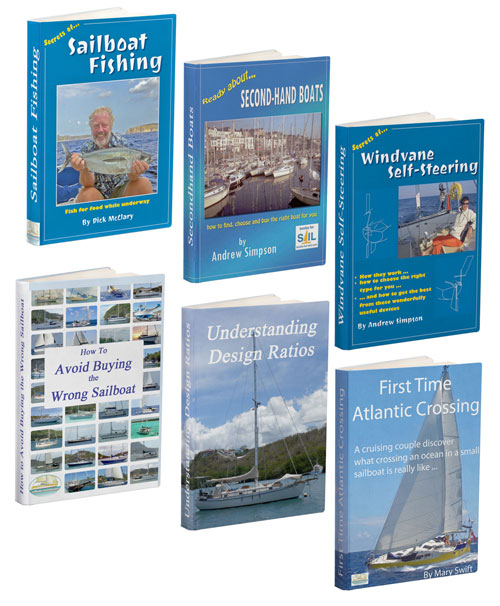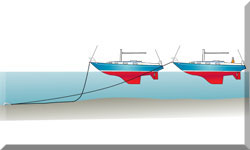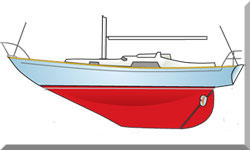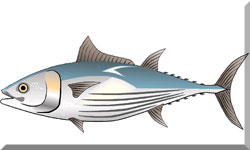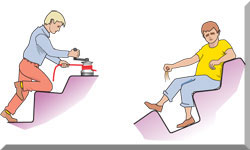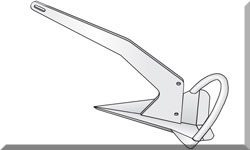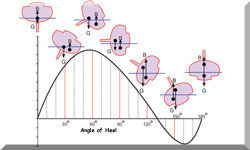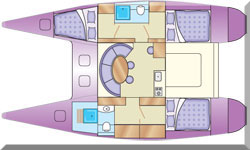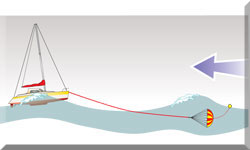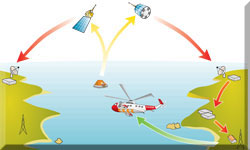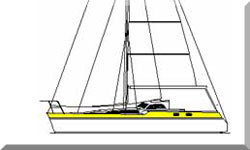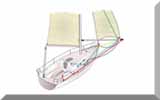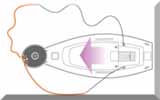- Home
- Nautical Terms and Phrases
Nautical Terms and Phrases in Everyday Use
but not in the way originally intended!
The English language is peppered with phrases that trace their origins back to the sea. Whether you’re all at sea when making a decision or need to batten down the hatches before a storm in life, many common expressions have roots in maritime history. Sailors, particularly in the age of exploration, developed a rich vocabulary that has navigated its way into daily conversation.
 When ships were made of wood and men were made of steel...
When ships were made of wood and men were made of steel...Let’s dive into this captivating voyage through language, uncovering the meanings, origins, and modern uses of the most seaworthy expressions.
Nautical Terms and Phrases - They're not always a complement!
Broad at the Beam is one such phrase. It's a ship term referring to the widest part of the ship's hull. When we talk about someone being "broad at the beam", we're talking about their generous physique! Likewise, By and Large was used to describe a ship's ability to sail well both into the wind (by) and with the wind (large). Today, we use it to mean 'in general.'
Imagine you've made a sharply worded comment intended as a warning to someone. You've essentially fired "A Shot Across The Bow." This phrase comes from naval warfare, where a ship would fire a warning shot to get an opponent's attention without causing damage.
Ever suspicious of someone's intentions and wish they were "Above Board?" meaning honest, not secretive or misleading. Historically, this referred to goods secretly stored below deck on a ship to hide them from customs officers.
Ever felt confused, disoriented, and "All At Sea?" Originally, it meant a ship that had lost its bearings and was directionless - much like we feel sometimes!
Ever been through a crisis and felt relief at finding a solution, no matter how imperfect? That's "Any Port in a Storm," an age-old seafaring term. Ships caught in threatening weather would seek shelter wherever they could, even if it meant venturing into unknown or unsuitable ports.
Ever wondered how birds navigate their way home or to warmer climes? They fly the most direct route or "As the Crow Flies," a phrase coined by early navigators who carried caged crows that, when released, would fly directly towards the nearest land, serving as a nautical compass.
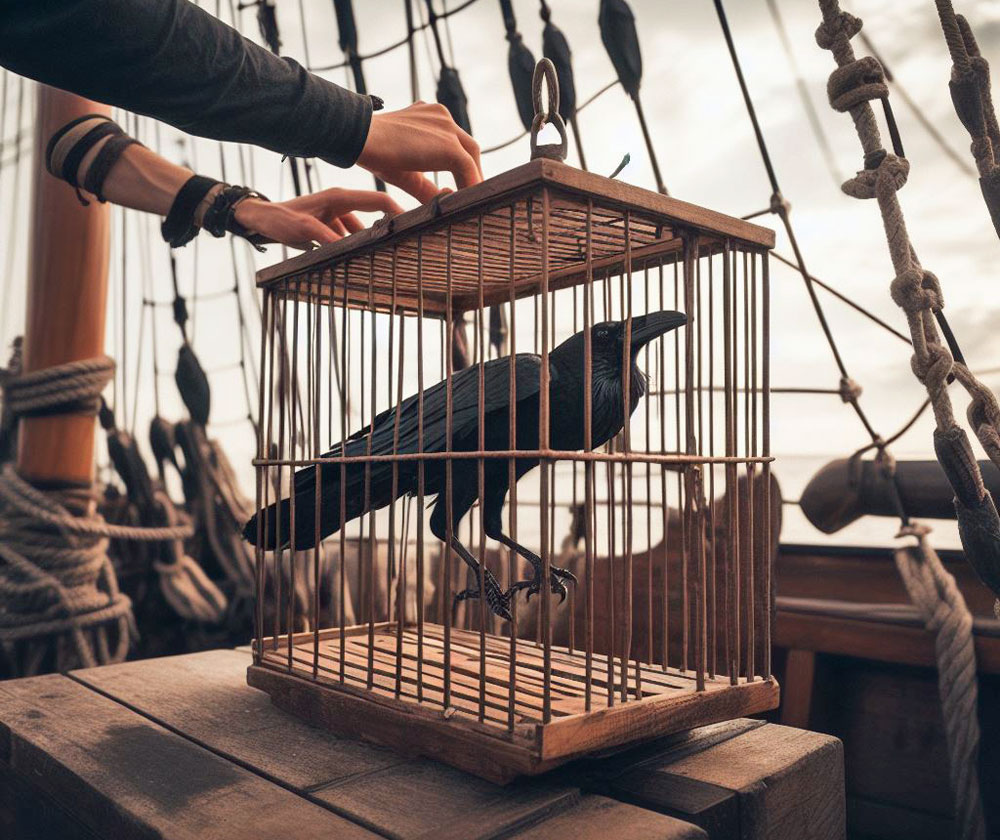 We'll be watching you...
We'll be watching you..."Batten Down the Hatches" sound familiar? Well, that meant to prepare a ship for bad weather or an upcoming storm literally. In everyday life, it means to prepare for a challenging situation.
How about when you clink glasses with your mates and say, "Bottoms Up"? Sounds like a fun evening out, right? In 18th and 19th century England, navy recruiters would trick men into service by slipping a King's Shilling into their beers. Unaware till their drink was finished, they were then conscripted. To counteract this, bar owners introduced clear-bottomed glasses, urging patrons to say "Bottoms up!" and inspect their pints before drinking..
Selling a product en masse or "Chock a Block"? That phrase described the blocks of a pulley system hauling up the heavy sails of a ship jammed tightly together due to a fully hoisted sail.
Ever been at "Loggerheads" with someone? It refers to a type of tool on ships used in disputes between sailors! The loggerhead was a long-handled tool with a ball or bulb at the end, primarily used to heat or melt tar and pitch. It was heated in a fire and then plunged into the substance, allowing for controlled melting without open flames. Another, less common, definition refers to an upright post on a whaleboat used to control the harpoon line.
Felt "Groggy" after a few drinks? That one's named after a less-than-appetizing brew of watered-down rum known as grog, which would leave sailors feeling a bit wobbly as they staggered about the ship! It was Admiral Edward Vernon who introduced grog to prevent excessive drinking. Too much grog left sailors feeling groggy—a word still used for post-nap drowsiness or illness.
Ever "Push the Boat Out" to celebrate something special? That comes from the ceremony of launching a new vessel. Simultaneously, "Go Overboard" is also a nautical term meaning to literally fall over the side of a ship, used now to describe doing something in excess.
Next time you see a "Skyscraper," know that it was not always a towering city building. Originally, it depicted the highest sail on the mast of large ships. Likewise, the term "Slush Fund" now used for sketchy political dealings once meant a collection of money created from selling leftover cookery oils from the ship's kitchen.
Feeling "Under the Weather?" This phrase references sailors who felt seasickness while on watch on the weather side of a ship. If it got too much, they'd be excused to go below deck.
Ever been in a situation where things were so crammed and tight you could hardly move? That’s precisely what the sailors meant by Chock a Block, except that they were referring to the blocks of their tackle being jammed close together. A "Clean Bill of Health", on the other hand, wasn’t just about a sailor being fit; it also referred to a ship not carrying any infectious diseases at the port it departed.
You know when someone shouts "Clear the Deck!" it means to prepare for action or remove obstacles. This command basically originates from the order given on a warship to clear away for action. The expression Close Quarters, on the other hand, came from the small spaces in a wooden warship where hand-to-hand fighting took place during battles. Nowadays, we use it to refer to a small or cramped space.
The expression "Copper Bottomed" refers to something reliable and trustworthy, much like the durable ships lined with copper to prevent damage by sea creatures. Ever been angry and simply wanted to "Cut and Run?" That's a direct take from the procedure of quickly cutting the ship’s anchor cable to make a swift escape. Equally dramatic is the phrase "Dead in the Water", which literally means your ship isn't moving – a hopeless situation indeed!
Now let's say you wanted to "Deal a Broadside", that means a severe verbal attack. Why? Because during naval battles, the most destructive way to fire cannons was across the width or ‘broadside’ of a ship. "Devil to Pay" was the grueling task of caulking the ship's longest seam (or "devil"). Today it means the tough consequences to face.
 Paying the Devil
Paying the DevilA favourite among the list is "Dutch Courage", which refers to the courage that flows in with a few drinks – a nod to the rivalry between the English and Dutch sailors of yesteryears. As for "Dressing Down", it doesn’t involve sartorial issues. Instead, it refers to the process of applying oil to sails to protect them, which had the side effect of making them look like they’ve been reprimanded or ‘dressed down.’
These nautical expressions might leave you "In the Doldrums," a term for areas of the ocean where wind is scarce, leaving sailing ships stranded. Nowadays, it's used to describe feeling in a rut or down in the dumps.
But there are many more nautical terms and phrases that hold similar detail and charm. For instance, did you know that the phrase "On Your Beam Ends", referring to a state of desperation, originally meant a ship tilting so much that its beams, the horizontal timbers, were almost vertical?
Even more interesting are expressions such as "Son of a Gun", meaning an impressive or surprising character, that originated from the rough living on board navy ships where sometimes, children were born in unexpected places, like between the canons (the guns).
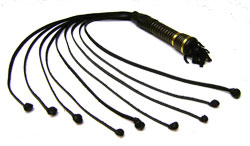 Cat O' Nine Tails
Cat O' Nine TailsThe phrase "no room to swing a cat" has an unclear origin, although it's generally used to describe a very small or cramped space. But one popular belief is that "cat" in this instance refers to the "Cat o' Nine Tails", a type of whip used in the British Royal Navy. The cat o' nine tails was used to discipline sailors, and the process required enough room to swing the whip freely. Hence, the phrase "no room to swing a cat" would indicate a very tight space where it would be impossible to conduct such a punishment.
Or the popular "Shiver Me Timbers", an expression of surprise or disbelief, inspired directly by the impact of cannonballs hitting a wooden ship.
Or "Show your True Colors" Now means to reveal one's true nature. Historically, ships would fly false flags until they were close enough to their enemies, then show their 'true colors'.
Or "Cut and run" meaning to leave quickly and abruptly, often to avoid a problem or difficulty. Initially, it described the hasty departure of a ship, where the anchor cable had to be cut for quick sailing.
Or perhaps "Three sheets to the wind" used to describe someone who's very drunk. Historically, if a ship's sheets (ropes) were loose, the ship's navigation would be as unsteady as a drunken person's walk.
While these nautical terms and phrases have evolved and moulded themselves into the fabric of our everyday lives, they carry within them the rich history, tales, and living conditions of sailors, their ships, and their voyages. They are a nostalgic reminder of the sea-faring world and a testament to the versatility and adaptability of language.
So next time when you're "Running a Tight Ship" by managing a business efficiently, think of the nautical world where such expressions originated. Or perhaps you're weathering a difficult situation, recall that you're just "Sailing Close to the Wind", just like the brave sailors of the past relying on their skills in a risky situation. And no matter how much you find yourself 'overwhelmed' in your life, remember, it's just an echo of those nautical days when a ship was swamped by high waves and submerged under the water.
And a few more nautical terms and phrases...
"Flotsam and Jetsam" – The Clutter We Leave Behind
Originally, these terms described items floating at sea: flotsam referred to wreckage unintentionally lost from a sinking ship, while jetsam described cargo deliberately jettisoned to lighten the load. Today, the phrase represents miscellaneous odds and ends or things of little value.
"Landlubber" – A Clumsy Newcomer to Any Field
A lubber was an awkward or inexperienced sailor, and a landlubber was someone unfamiliar with life at sea. Now, the term describes anyone lacking expertise in a particular area, whether they’re struggling with software or fumbling through a sport.
"Aloof" – To Stand Apart or Be Different
The term aloof originates from the old Dutch word “loef”, meaning windward. In naval terms, it described a ship within a fleet that sailed higher into the wind than the others, distancing itself from the formation. This separation wasn’t necessarily intentional—it was simply a result of positioning. Over time, the word evolved into a metaphor for individuals who remain distant or detached, whether physically or emotionally. Today, if someone is described as aloof, it means they’re withdrawn, reserved, or purposefully standing apart from a group, much like that lone ship catching the wind at a different angle.
"Scuttlebutt" – Gossip at the Water Cooler
A scuttlebutt was a water barrel on a ship where sailors gathered to drink—and, naturally, swap stories. The term now means rumours or workplace chatter, much like discussions around the office coffee machine.
"Shanghai'd" – Forced Into an Unwanted Situation
Sailors were sometimes shanghaied, meaning kidnapped and forced to serve on ships, often after being tricked into an inebriated state. Today, being shanghaied means getting coerced into something against one’s will—whether that’s a surprise errand or an undesirable task.
"Loose Cannon" – An Unpredictable Force
Cannonballs were destructive, but a loose cannon rolling on deck posed a different kind of danger, threatening sailors and equipment alike. The phrase now describes someone who is uncontrollable or reckless.
"Hunky Dory" – Everything is Fine
The phrase supposedly comes from sailors docking at Honcho Dori, a street in Yokohama, Japan, known for its entertainment. If things were hunky dory, life was good. Today, it simply means everything is smooth sailing.
"Shipshape" – Tidy and Organized
A ship in good condition was called shipshape, meaning everything was stowed properly. The term remains a compliment for neatness, whether referring to a spotless office or a well-maintained home.
"Freeze the Balls Off a Brass Monkey" – Extreme Cold
A myth claims this phrase originated from brass racks (monkeys) holding cannonballs, which contracted in the cold, causing the balls to fall. While disputed, the phrase humorously expresses freezing conditions.
"Pipe Down" – Be Quiet!
Sailors used a boatswain’s pipe to signal when it was time for silence. The phrase remains a shorthand command for quieting down—whether in classrooms, meetings, or noisy restaurants.
Got any more?
If so, send them to me via Contact Us and I'll include them here.
.........................
I wrote this article using GPT-4, OpenAI’s large-scale language-generation model, as a research assistant to gather information, summarize research findings, and provide suggestions for the content and structure of the article.
Dick McClary, creator and owner of sailboat-cruising.com
.........................
Recent Articles
-
Albin Ballad Sailboat: Specs, Design, & Sailing Characteristics
Jul 09, 25 05:03 PM
Explore the Albin Ballad 30: detailed specs, design, sailing characteristics, and why this Swedish classic is a popular cruiser-racer. -
The Hinckley 48 Sailboat
Jul 09, 25 02:44 PM
Sailing characteristics & performance predictions, pics, specifications, dimensions and those all-important design ratios for the Hinckley 48 sailboat... -
The Hinckley Souwester 42 Sailboat
Jul 09, 25 02:05 PM
Sailing characteristics and performance predictions, pics, specifications, dimensions and those all-important design ratios for the Hinckley Souwester 42 sailboat...
